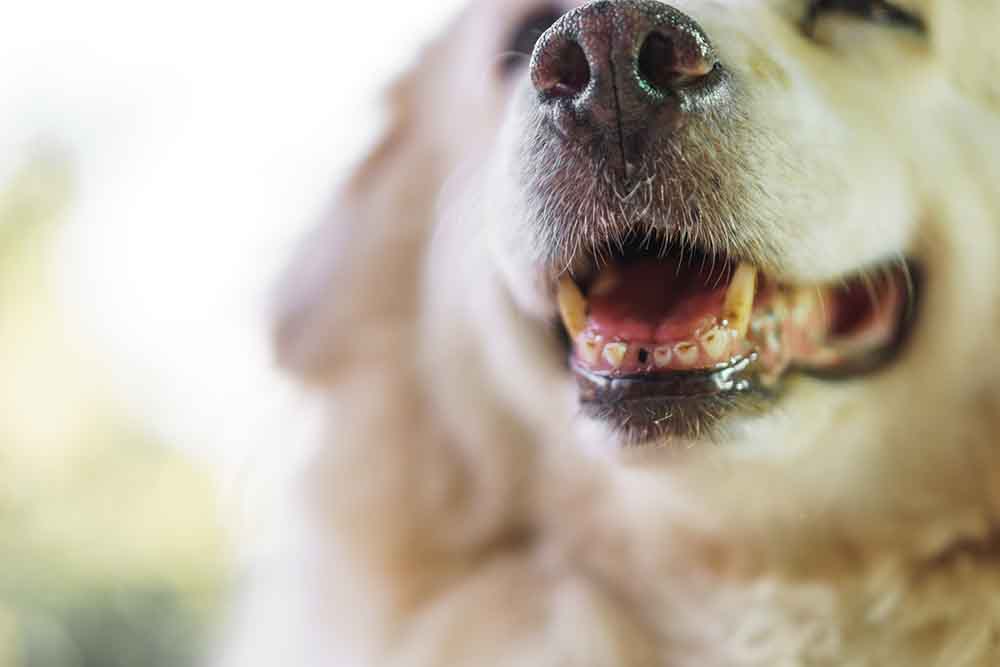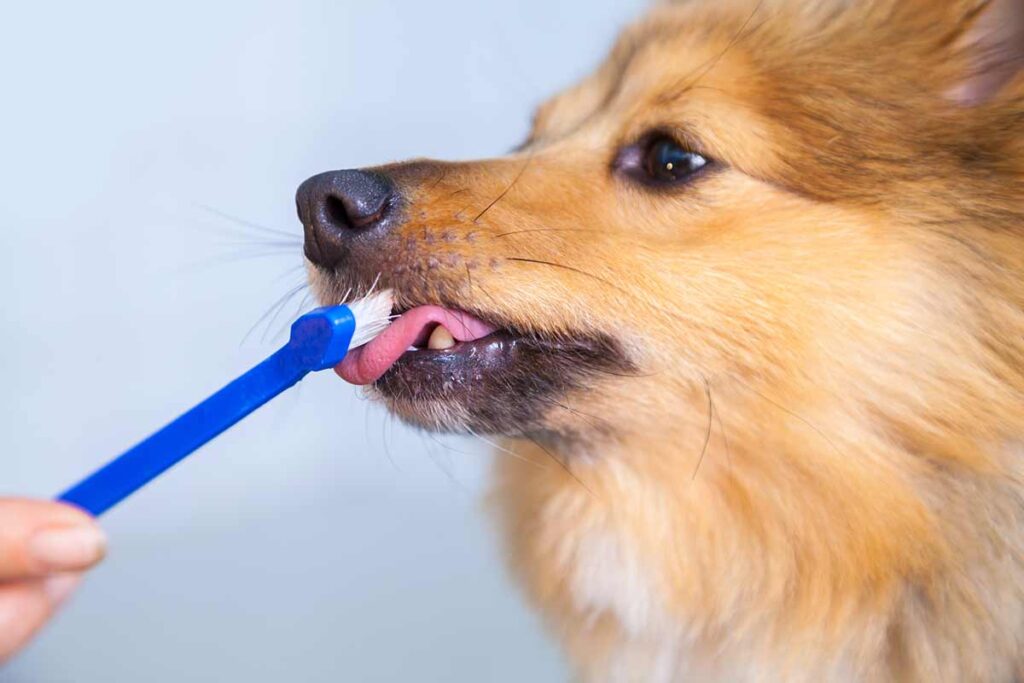Kidney and liver disease
Your dog’s kidneys and liver play a vital part in your older dog’s overall health. There are many symptoms that can lead to a diagnosis of kidney or liver disease, and one of them is bad breath. If your dog’s breath smells like ammonia (similar to bleach) then it could be a problem with their kidneys. While a particularly foul-smelling breath, accompanied by vomiting, lack of appetite and a yellow tinge to their gums might be due to a liver problem.
What to do: Both kidney and liver disease can be signs of a serious medical condition. So, it’s vital you get your dog to the vet as soon as possible. Call the Petwise 24-Hour Vet Helpline for advice if you’re worried.
A gut infection, vomiting bug or blockage can cause your older dog to have smelly breath. But it’s likely you’ll already have noticed other signs such as vomiting, or diarrhoea before you notice their bad breath.
What to do: According to the PDSA over 2,700 pets a year are treated by their vets for blockages caused by something they’ve eaten. From bones and corn on the cob to socks and bouncy balls it’s surprising what can end up inside a dog! So, if you see them chewing on something, check it’s not something that could do them harm.
Bad breath is also a sign of an infection of the throat, lung, or sinus, along with excessive drooling and loss of appetite.
What to do: Dogs are remarkably resilient creatures and such infections often clear up on their own. But it’s always wise to get them checked out with your vet. A short course of antibiotics might be needed to treat the infection. Theyll also perform a thorough examination to check nothing else is wrong.
If your old dog develops a mouth tumour you may notice a really nasty smell along with blood-stained saliva and problems eating.
What to do: Early detection is key when it comes to treatment of mouth tumours. So, if you notice these symptoms then an urgent trip to see your vet is essential.
Top Causes of Bad Breath in Senior Dogs

Bad breath can come from the mouth and other areas of your older dog’s body. It can be an indicator that something is very wrong, so it’s important to find out what’s behind your dog’s bad breath.
A dirty mouth almost always leads to bad breath. Plaque and tartar accumulate on teeth, harboring bacteria and contributing to tooth decay. You may also notice bleeding from your dog’s mouth, not wanting to eat hard food and red, swollen gums.
At-home brushing with a dog-specific toothbrush and toothpaste can help to remove and prevent plaque and tartar buildup and relieve some mouth discomfort and bad breath.

However, dental disease usually requires a professional cleaning with antibiotics followed by preventive care. Dogs will need to be anesthetized for a professional cleaning. Medications, dental x-rays, and extractions may end up costing you $300-$800. Most senior pups respond well to a dental cleaning even with extractions.
Common causes of bad breath in old dogs
Many dog owners simply dismiss bad breath as just ‘dog breath’ and nothing to worry about. However, there can often be a more sinister reason behind the odour that needs investigation by a professional. Here’s some of the most common culprits of bad breath in old dogs.
Number 1 on the list of most common causes of bad breath in dogs is poor oral hygiene. Just like in humans, the build-up of plaque and tartar can soon lead to the growth of bad-breath-causing oral bacteria. If you don’t brush your dog’s teeth, or they’re not a keen chewer then this is probably the cause of their bad breath.
Over time, if the plaque and tartar is not removed then it can even push the gums away from the teeth, exposing yet more areas on which harmful bacteria can develop. This not only causes gingivitis (inflammation of your dog’s gums), but it can lead to cavities, infection, tissue destruction, and even tooth loss. No wonder they end up with bad breath!
But it’s not just bad breath that warns of doggy dental issues. It’s a vital part of canine care to check your dog’s mouth for signs of oral disease. Look out for these warning signs:
For more top tips on looking after your dogs teeth check out this blog.
What to do: The easiest thing you can do is to get into the habit of brushing your dog’s teeth regularly. As well as brushing, try giving them a dental chew or toy to help clean the teeth through the natural chewing motion. Although Blue Cross warns chews should be of an appropriate size for your dog – too small and they might choke, too large and they might harm their teeth.
If you suspect your dog has tooth or gum disease then it’s time to get some professional help with a dental check-up. If you ignore these types of problems then your faithful pooch can soon start to lose teeth and issues may even start to spread to other parts of the body.
Be aware that smaller breeds are more prone to dental disease. This is because their teeth tend to be closer together, which promotes plaque and tartar build-up. It’s important to provide them with plenty of chew toys from a young age and get in the habit of brushing their teeth.
Finally, if you arrange pet insurance for older dogs from Petwise then dental cover is included as standard on all policies.
Yes, that off-putting smell might be down to what you’re feeding them, as some dog foods can cause more smelly breath than others. This is because the makers of commercially available dog foods often use fish as a cheap and plentiful source of protein. It also contains plenty of Omega fatty acids to benefit your older dog’s coat and joints.
Even if your food doesn’t seem to be fish based, it’s still worth checking the ingredients list. Often other protein-containing ingredients will mask the obvious fishy smell. However, in higher concentrations – and if your dog is eating the product every day – you might begin to notice the smell more.
What to do: While it causes no harm, if the smell really is that unbearable then perhaps try one with a different formulation and see if that does something about the problem. Or you could try a fresh breath spray. As long as they have good oral health these sprays can help promote fresh smelling breath. Talk to your vet to see if there’s one they can recommend or call the Petwise 24-Hour Vet Helpline for advice.
If your dog likes to hunt around for food, you might often find them nibbling on something that really isn’t edible. This usually doesn’t cause them harm but sometimes something can get stuck in your dog’s mouth and cause a problem. Whether a sliver of plastic from a broken toy, a piece of wood or a shard of bone, if it gets stuck it could cause an infection and an unpleasant smell.
What to do: Keep an eye on what they are chewing. If pieces start to break off then it might be worth stepping in. While regular brushing should dislodge any debris, if this doesn’t help then a trip to the vet might be in order. If untreated a painful abscess could develop in the mouth causing further pain, smells and complications.
A strange, unpleasant smell emanating from your dogs mouth may also be a sign they’ve eaten something poisonous and they need urgent medical attention. For example, certain fertilizers and pest poisons contain chemical compounds like phosphorus or zinc phosphide that produce a strong odour when mixed with your dogs saliva.
As well as a strange smell, other common symptoms of poisoning include:
What to do: Seek immediate veterinary attention. Many poisons are more than capable of killing your beloved hound and can cause irreparable harm to their liver and kidneys. The outcome will depend entirely on how soon you can get it out of your dogs system – every moment counts.
Remember to keep any type of poison well out of reach of your inquisitive dog. So your four-legged friend can remain safe at all times. And if the worst does happen, pet insurance for older dogs will be there to help you cover the costs of emergency treatment.
No matter how loveable they are, dogs can have some pretty gross habits which lead directly to awful breath. From raiding the rubbish bin, or eating decomposing animal remains, to chowing down on animal faeces, there are many disgusting temptations for your dog to resist. Not only will these ‘snacks’ make their breath smell but it’s also unhygienic and puts your dog at risk of parasitic infections and disease. There are certain foods that a dog can and cant eat and you can learn more about this in our blog.
What to do: Aside from keeping your dog away from such opportunities as much as possible, your best bet to solve this issue would be to speak to an animal behaviourist. They may be able to give you training tips to help your dog resist these tasty temptations. The RSPCA has invaluable advice on how to find a clinical animal behaviourist.
Three words that no dog owner wants to hear. Particularly when eating. If a dog’s anal glands become blocked then the fluid in them can build up and start to leak. So, when your dog licks at the glands the liquid and its foul smell finds its way to their mouth. Unfortunately, it’s a common problem that an old dog can suffer from. But the good news is that relief is not difficult to provide – although it can be unpleasant for you!
What to do: Expressing a blocked gland is probably a job for the vet but some owners don’t mind learning how to do it themselves, especially if they’ve had the dog for a number of years and formed a very close bond. If you do decide to give it a go yourself, make sure you put the pup in the garden or in the bath in case there’s a mess. Try to keep them as calm as possible and remember to wear gloves and wash your hands thoroughly afterwards.
If your dog’s bad breath has a sweet or fruity smell to it (similar to nail polish remover or pear drops), you need to make an emergency appointment with your vet. Sweet, fruity breath is a symptom of a serious condition called diabetic ketoacidosis.
While the first symptoms of diabetes in dogs tend to include the following:
If left untreated this can develop into diabetic ketoacidosis. As well as the distinctive sweet breath smell other symptoms include:
What to do: Book an immediate vet appointment. Pet charity PDSA has lots of further information on diabetes and other canine health problems that could lead to bad breath in older dogs. Read our recent guide on what are the signs of diabetes in an older dog and how to spot them.
Why has my senior dog got bad breath? | DogVela
Every dog owner will agree that only a handful of smells are as unpleasant as a senior dog’s bad breath. Many people think that it’s natural for dogs to have foul breath, but that’s not true. In most cases, the bad breath of a canine has a valid reason that needs to be determined and treated. Keep reading to know about the methods that can prevent and treat the bad breath of a senior dog.